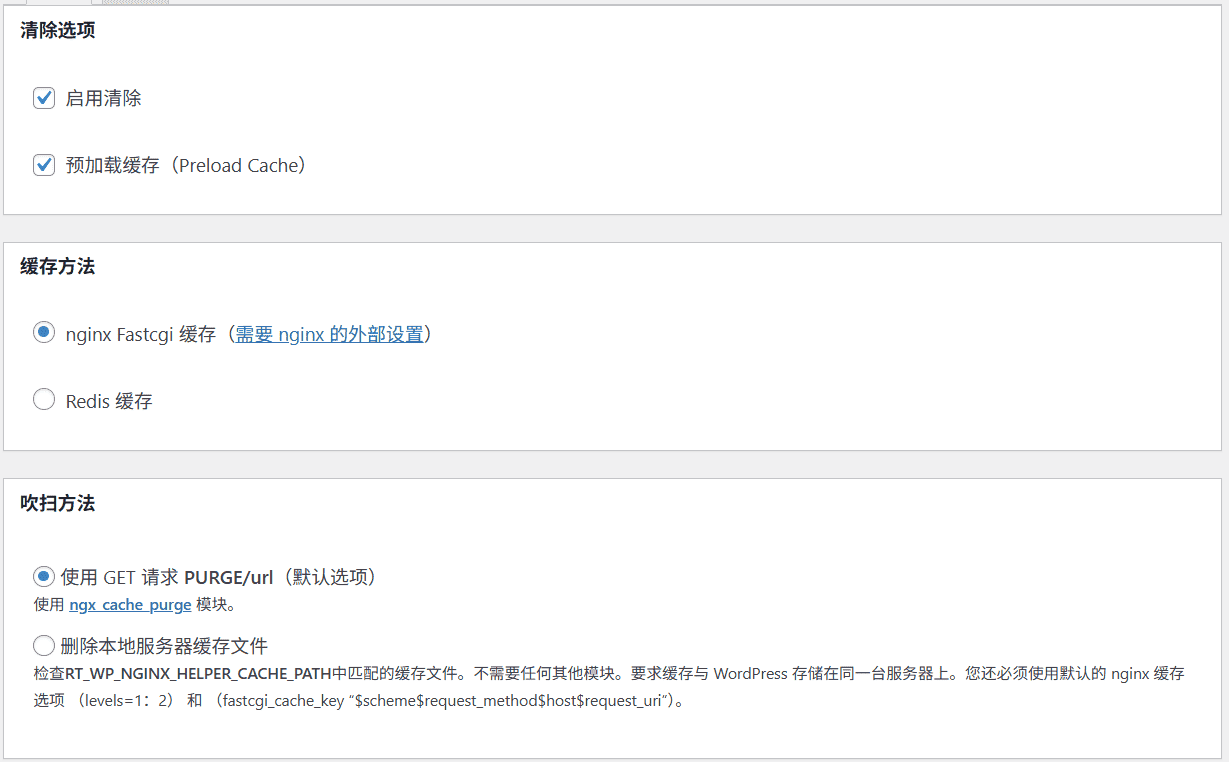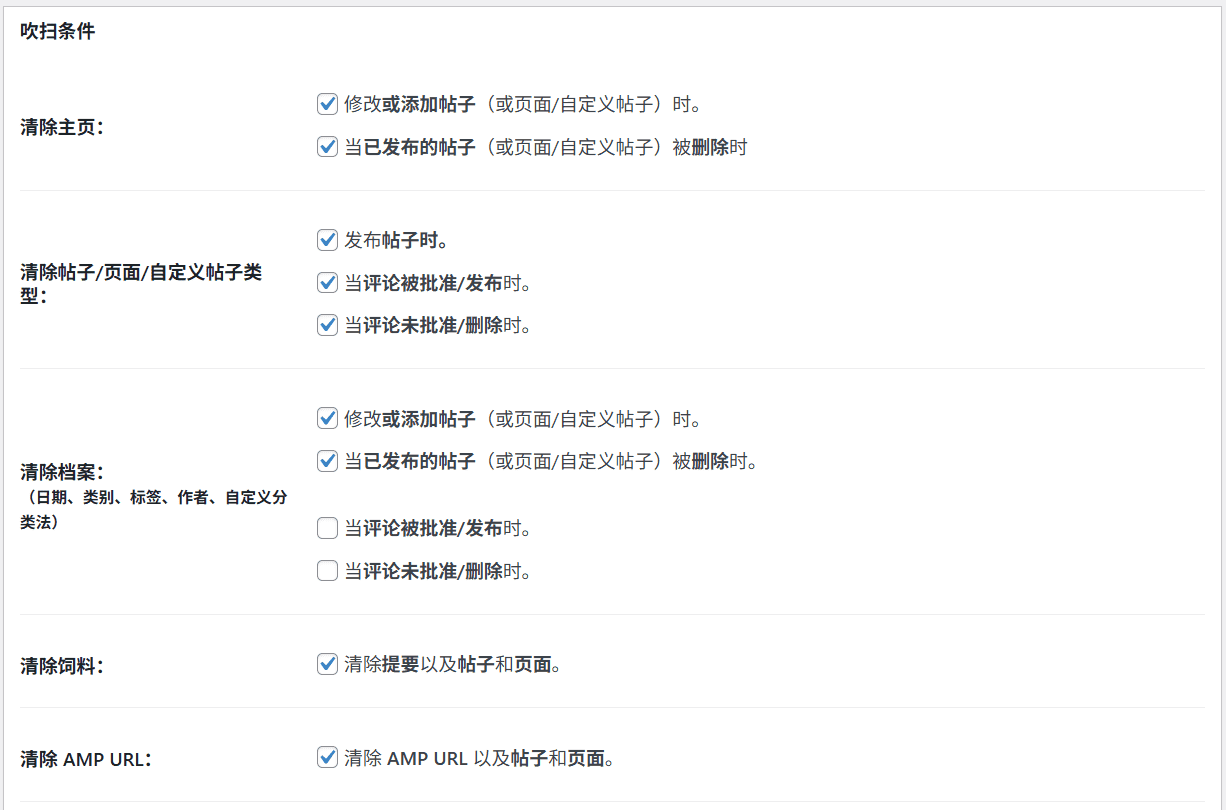什么是 Nginx Helper?
Nginx Helper是一款免费的开源插件,专为在 Nginx 服务器上运行的 WordPress 网站而设计。它是 WordPress 和 Nginx 之间的重要桥梁,让您更轻松地管理缓存、简化配置并提升网站整体性能。
主要优点
- 简化配置——无需复杂的手动设置。
- 改进的性能– 确保您的 WordPress 网站在 Nginx 上顺利运行。
- 细粒度的缓存管理——直接从 WordPress 仪表板清除和管理缓存文件。
- 轻巧、干净——完全免费、无广告、易于使用。
安装
您可以直接在 WordPress 官方插件库中找到该插件。只需搜索“Nginx Helper”,然后从 WordPress 管理面板安装并激活即可。
如何为 WordPress 配置 Nginx Helper 插件
Nginx Helper插件允许运行在 Nginx 上的 WordPress 网站高效地管理 FastCGI 缓存。以下是如何设置该插件以及如何选择合适的缓存清除方法。
1.启用缓存清除和预加载
- 转到插件设置并检查选项以启用缓存清除和缓存预加载。
2.选择Nginx FastCGI缓存
- 选择“Nginx FastCGI Cache”作为缓存方法。
3.选择缓存清除模式
- 同一服务器上的多个网站:选择“使用 GET 请求 PURGE/url”。
- 服务器上的单个网站:选择“删除本地服务器缓存文件”。
使用GET请求 PURGE/url:
- 该插件向 Nginx 发送类似的请求。
PURGE /your/url - Nginx 将使用配置来定位并删除相应的缓存文件。
fastcgi_cache_key - 要求和注意事项:
- 保持 Nginx 设置中配置的清除路径。
- 为了安全起见,清除访问通常仅限于特定的 IP。
- 如果您使用 CDN,请将您的域名添加到指向服务器真实 IP 的位置。这样可以确保插件可以直接清除缓存,而无需经过 CDN,避免请求被阻塞。
/etc/hosts
- 如果这个设置看起来太复杂,那么跳过这个模式会更安全。
删除本地服务器缓存文件:
- 该插件直接从服务器文件系统中定义的目录中删除缓存文件。
RT_WP_NGINX_HELPER_CACHE_PATH - 不需要 ngx_cache_purge 模块。
要求:
- 缓存目录结构必须遵循levels=1:2。
- 缓存键必须是:
"$scheme$request_method$host$request_uri" - 缓存必须驻留在本地服务器上(不能是远程或共享存储)。
重点:
- 该插件的默认缓存路径是。
/var/run/nginx-cache - 如果您的服务器使用自定义缓存路径,插件可能无法定位和删除文件。
- 要解决此问题,请编辑插件文件:
/wp-content/plugins/nginx-helper/includes/class-nginx-helper.php在第 88 行左右,用实际的缓存目录替换默认路径。 - 如果你使用宝塔并开启了防止跨站攻击,那么需要在网站根目录的.user.ini文件中加入自定义的缓存目录,允许PHP open_basedir访问缓存,注意每个路径之间用
:分隔,末尾加/。
此设置可确保您的 WordPress 网站可以有效地清除和管理 Nginx FastCGI 缓存,无论是使用直接文件删除还是 PURGE 请求。

这部分默认即可:

如果你有自定义存档页等非标准页面,需要清除缓存可以把URL单独列在下面,只填你域名后面的部分:

免插件清理 fastcgi_cache(Nginx Helper 纯代码版)
Nginx Helper 这款插件主要用于 Nginx fastcgi_cache 缓存或 Redis 缓存清理,用起来确实不错,但因为某些原因你实在不想用插件的话,也可以使用张戈的纯代码。
/**
* WordPress Nginx FastCGI 缓存清理代码(Nginx-Helper 纯代码版) By 张戈博客
* 文章地址:https://zhang.ge/5112.html
* 转载请保留原文出处,谢谢合作!
*/
//初始化配置
$logSwitch = 0; //配置日志开关,1 为开启,0 为关闭
$logFile = '/tmp/purge.log'; //配置日志路径
$cache_path = '/tmp/wpcache'; //配置缓存路径,设置为你的缓存路径
//清理所有缓存(仅管理员) 范例:http://www.domain.com/?purge=all
if ($_GET['purge'] == 'all' && is_user_logged_in()) {
if( current_user_can( 'manage_options' ))
{
delDirAndFile($cache_path, 0);
}
}
//缓存清理选项
add_action('publish_post', 'Clean_By_Publish', 99); //文章发布、更新清理缓存
add_action('comment_post', 'Clean_By_Comments',99); //评论提交清理缓存(不需要可注释)
add_action('comment_unapproved_to_approved', 'Clean_By_Approved',99); //评论审核清理缓存(不需要可注释)
//文章发布清理缓存函数
function Clean_By_Publish($post_ID){
$url = get_permalink($post_ID);
cleanFastCGIcache($url); //清理当前文章缓存
cleanFastCGIcache(home_url().'/'); //清理首页缓存(不需要可注释此行)
//清理文章所在分类缓存(不需要可注释以下 5 行)
if ( $categories = wp_get_post_categories( $post_ID ) ) {
foreach ( $categories as $category_id ) {
cleanFastCGIcache(get_category_link( $category_id ));
}
}
//清理文章相关标签页面缓存(不需要可注释以下 5 行)
if ( $tags = get_the_tags( $post_ID ) ) {
foreach ( $tags as $tag ) {
cleanFastCGIcache( get_tag_link( $tag->term_id ));
}
}
}
// 评论发布清理文章缓存
function Clean_By_Comments($comment_id){
$comment = get_comment($comment_id);
$url = get_permalink($comment->comment_post_ID);
cleanFastCGIcache($url);
}
// 评论审核通过清理文章缓存
function Clean_By_Approved($comment)
{
$url = get_permalink($comment->comment_post_ID);
cleanFastCGIcache($url);
}
//日志记录
function purgeLog($msg)
{
global $logFile, $logSwitch;
if ($logSwitch == 0 ) return;
date_default_timezone_set('Asia/Shanghai');
file_put_contents($logFile, date('[Y-m-d H:i:s]: ') . $msg . PHP_EOL, FILE_APPEND);
return $msg;
}
// 缓存文件删除函数
function cleanFastCGIcache($url) {
$url_data = parse_url($url);
global $cache_path;
if(!$url_data) {
return purgeLog($url.' is a bad url!' );
}
$hash = md5($url_data['scheme'].'GET'.$url_data['host'].$url_data['path']);
$cache_path = (substr($cache_path, -1) == '/') ? $cache_path : $cache_path.'/';
$cached_file = $cache_path . substr($hash, -1) . '/' . substr($hash,-3,2) . '/' . $hash;
if (!file_exists($cached_file)) {
return purgeLog($url . " is currently not cached (checked for file: $cached_file)" );
} else if (unlink($cached_file)) {
return purgeLog( $url." *** CLeanUP *** (cache file: $cached_file)");
} else {
return purgeLog("- - An error occurred deleting the cache file. Check the server logs for a PHP warning." );
}
}
/**
* 删除目录及目录下所有文件或删除指定文件
* 代码出自 ThinkPHP:http://www.thinkphp.cn/code/1470.html
* @param str $path 待删除目录路径
* @param int $delDir 是否删除目录,1 或 true 删除目录,0 或 false 则只删除文件保留目录(包含子目录)
* @return bool 返回删除状态
*/
function delDirAndFile($path, $delDir = FALSE) {
$handle = opendir($path);
if ($handle) {
while (false !== ( $item = readdir($handle) )) {
if ($item != "." && $item != "..")
is_dir("$path/$item") ? delDirAndFile("$path/$item", $delDir) : unlink("$path/$item");
}
closedir($handle);
if ($delDir)
return rmdir($path);
}else {
if (file_exists($path)) {
return unlink($path);
} else {
return FALSE;
}
}
}将整段粘贴到 WordPress 主题函数模板文件 functions.php 当中即可。现在发布/更新文章、评论提交/审核,就会自动删除当前文章缓存了,发布/更新文章还会清理首页、分类以及相关标签页缓存(不需要可根据代码中的注释进行屏蔽)。
另外,如果想清理全部缓存,可在管理员登陆状态下访问首页+?purge=all 参数,比如:https://soez.website/?purge=all ,其他用户或访客访问这个地址则没有任何作用,如果还不放心也可以自行更改代码中的参数判断字符串。经过测试,这种带参数的路径同样会被 Nginx 缓存,也就说?purge=all 只能用一次,第二次刷新就没效果了,因为被 Nginx 缓存了,要解决也很简单,在网站的 fastcgi 缓存配置中排除这个路径即可:
# 后台/特殊页面不缓存
if ($request_uri ~* "purge=all|/wp-admin/|/xmlrpc.php|wp-.*.php|/feed/|index.php|sitemap(_index)?.xml") {
set $skip_cache 1;
}这些配置能基本满足大部分网站的缓存需求。










